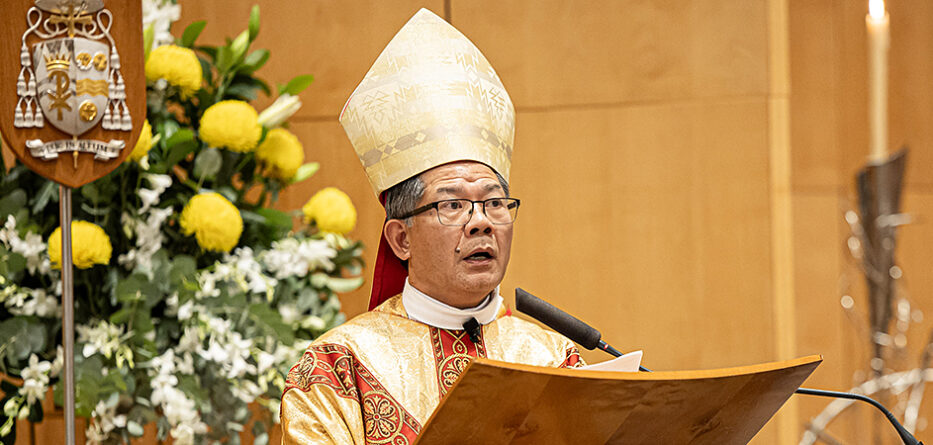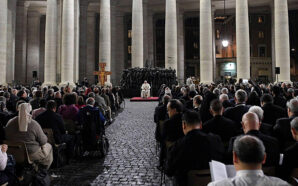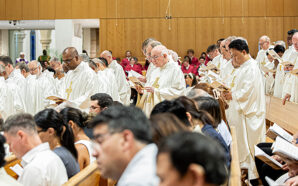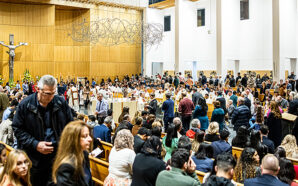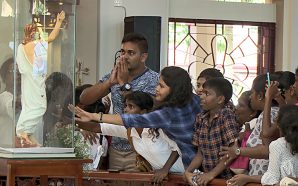Most Reverend Vincent Long Van Nguyen OFM Conv DD STL, Bishop of Parramatta
Homily for the Fourth Sunday of Easter (Good Shepherd Sunday), Year B
Readings: Acts 4:8-12; Psalm 117(118):1, 8-9, 21-23, 26, 28-29; 1 John 3:1-2; John 10:11-18
21 April 2024
Building a society that models Jesus’ outreach to the rejected
Dear brothers and sisters,
This past week has been trying for us and even more traumatic for those who were affected by the two separate stabbing incidents. They have left us shaken, anxious and on edge. We have seen some of the worst of human behaviour; but by the same token, we have also witnessed some of the best demonstrations of human nature.
We thank God for the courage and dedication of the police, first responders and even bystanders who came to the aid of the victims notwithstanding the dangerous and distressing situation and the risk of their own safety. There were many who showed acts of selflessness, kindness, compassion and empathy.
As the people of faith, we are called to build social cohesion, harmony and friendship in a fragmented and polarised world. We must be especially united against all forms of violence, scapegoating and ostracising others on the basis of their race, religion and belief system.
The Word of God on this Fourth Sunday of Easter teaches us that God reveals Himself as one who identifies with the victims of hatred, injustice, persecution and marginalisation. His resurrection is also the vindication and glorification of all those who in the words of St Peter today are rejected by the world but are faithful to and therefore accepted by God.
The Acts of the Apostles presents us with a small and vulnerable group of believers. They emerged from the turbulent period following the crucifixion of Jesus. We are told that this early Church was poor, few in numbers, marginalised by the dominant society and persecuted by the authorities. Yet it was a powerhouse of prayer, love and solidarity. They showed to the world what it was like to live with neighbourly concern, compassion and communion.
In today’s episode, Peter shows the maturity of his faith. He boldly proclaims the Christ who contrary to popular expectations was the victim on the cross. This proclamation reflects a totally different vision of the Messiah to the one he was obsessed with before. In one instance, if you remember, he professed Jesus to be the Christ but without the cross. He bought into the model of greatness that was predicated on power, dominion and self-interest. Now, Peter has made a 180-degree turn-around. It is the Crucified who is at the centre of his new life. He is the stone rejected by the builders which has become the cornerstone.
In the Gospel, Jesus uses the parable of the Good Shepherd to show how much he cares for all, but especially the weak and vulnerable. He is the ultimate expression of the divine pathos towards humanity. “I am the good shepherd who lays down his life for his sheep.” In Jesus who surrounds Himself with the outcast, we see a God of solidarity and vulnerability. In Jesus, we meet a God who disturbs our comfort and pushes us out to the periphery to be with the least of His brothers and sisters.
The image of Jesus as the Good Shepherd is one of the most endearing but also the most sentimentalised and domesticated to the extent that we are not sufficiently challenged by the message it is meant to convey. For when Jesus identified himself as a shepherd, He in fact made Himself an outcast. Shepherds were not only of lower class but also of a different race to the Jews. Even to this day, shepherds in Palestine are generally descendants of the nomadic Arabs, known as the Bedouins. In calling Himself a shepherd, Jesus became a boundary breaker. He broke the barriers of class, race and culture in order to embrace others who were considered outsiders. By identifying with the rejected, He became, as Peter affirms, the cornerstone of God’s new social order. This stepping into the place of the victim on the part of Jesus in turn destroyed all our scapegoating mechanisms. In Jesus crucified and glorified, we are delivered from our propensity to violence and scapegoating. We can now build a new future with the very people whom we regard as threats, outsiders or even enemies. This is what the Kingdom of God is all about.
Dear friends,
We are a community that proclaims and lives the power of the Crucified. We are committed to build a society that models Jesus’ outreach to the poor, the vulnerable and the victims of economic, political, social or religious marginalisation.
This Sunday is also designated as Vocations Sunday. We reflect on our Christian vocation to holiness. Pope Francis reminds us that each of us is called into existence and each of us is chosen for a purpose in this world. None of us is excluded from the love of God and none of us is outside God’s plan, no matter who we are and what circumstances we find ourselves. As St John reminds us today, we are all children of God and as such we are lavished with His love.
Jesus our Good Shepherd is a revelation of the God who defies the way the world operates. In His Kingdom, the last shall be first, the sorrowful comforted, the poor enriched and the rejected dignified. Let us strive to live in love and love like Jesus so that we can rid the world of hatred, violence and injustice. Let us work together to extend the reign of God’s Kingdom far, deep and wide, within us and beyond us.




